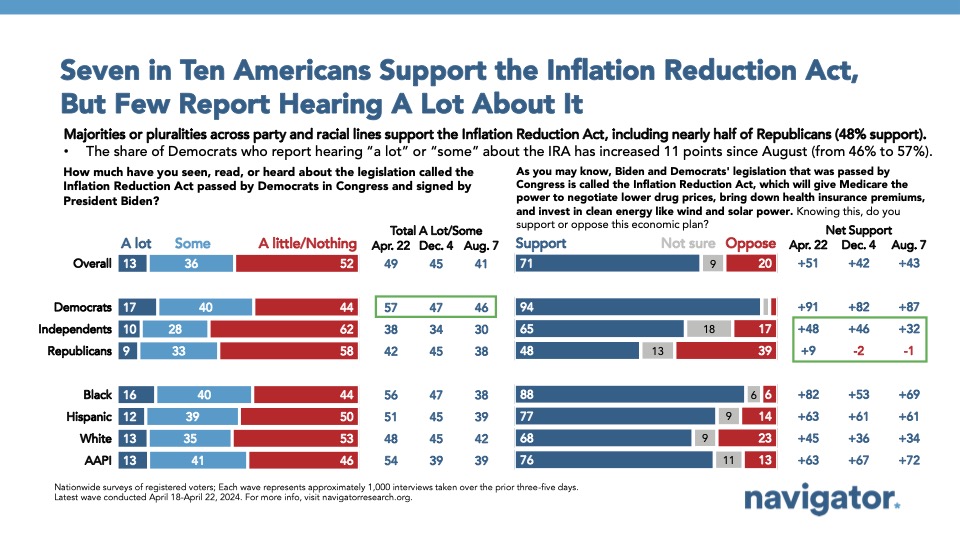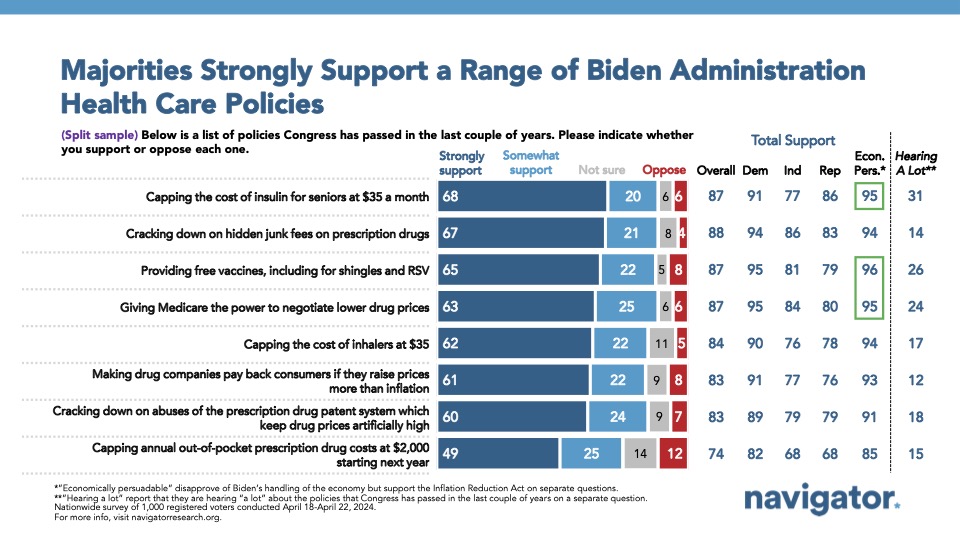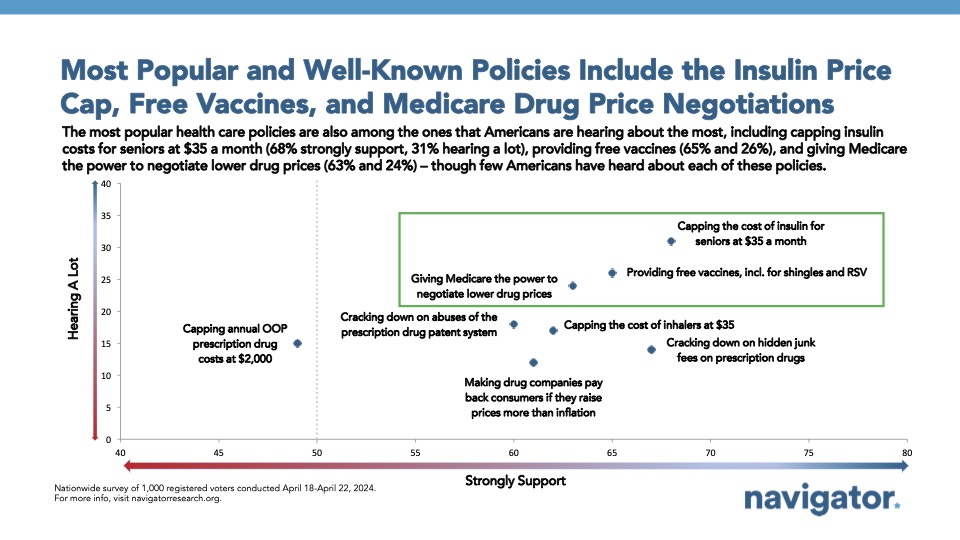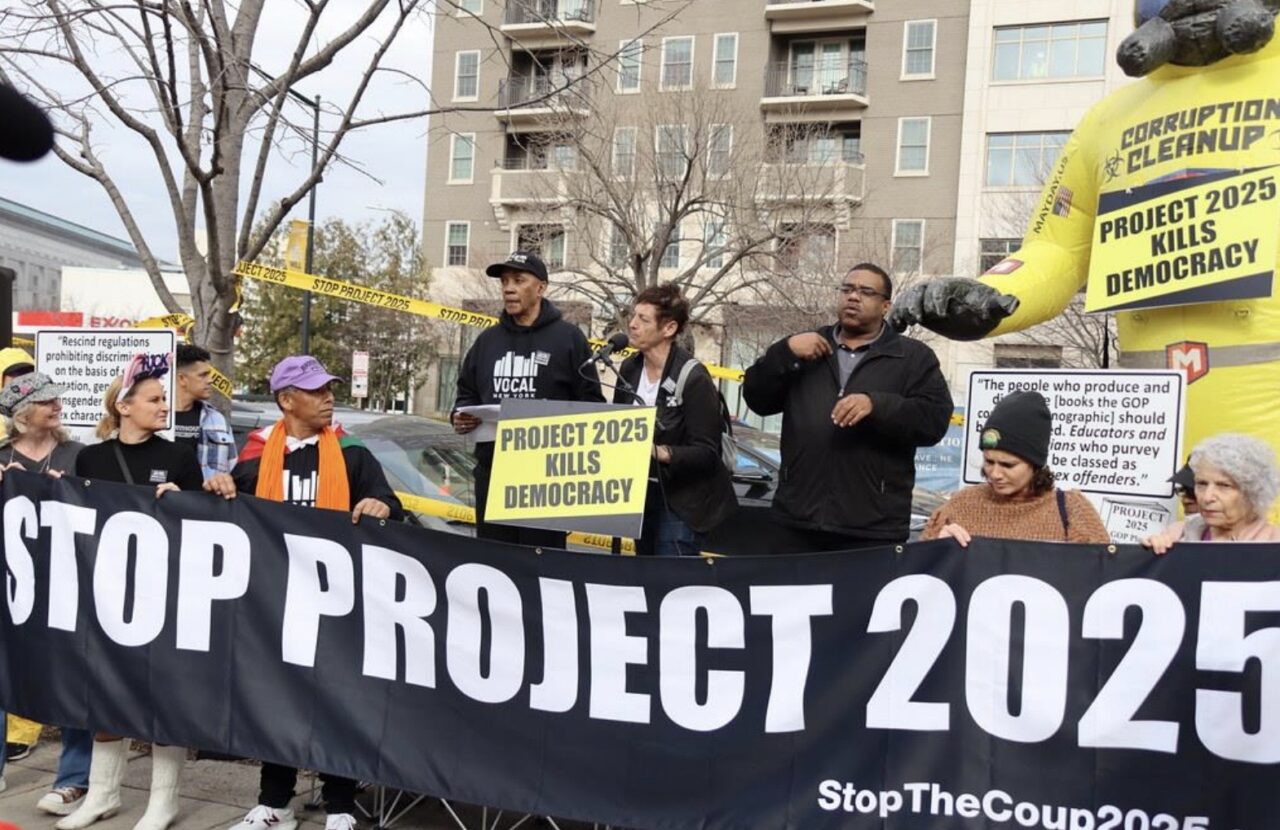Poll: Support for the Inflation Reduction Act
This Navigator Research report contains polling data on tracking support for and awareness of the Inflation Reduction Act, including the level of support for and awareness of a number of health care policies Congress has enacted, many of which are part of the Inflation Reduction Act.
By a 51-point margin, seven in ten Americans support the Inflation Reduction Act, a record high since its passage.
71 percent support the Inflation Reduction Act when described as “giv[ing] Medicare the power to negotiate lower drug prices, bring[ing] down health insurance premiums, and invest[ing] in clean energy like wind and solar power” (71 percent support – 20 percent oppose), including more than nine in ten Democrats (net +91; 94 percent support – 3 percent oppose), two in three independents (net +48; 65 percent – 17 percent oppose), and even a plurality of Republicans (net +9; 48 percent – 39 percent oppose).
- Support is even higher among Americans living in a union household (net +59; 79 percent support – 20 percent oppose), Americans under the age of 35 (net +61; 78 percent support – 14 percent oppose), college-educated women (net +67; 77 percent support – 10 percent oppose), and moderates (net +63; 76 percent support – 13 percent oppose).
- Yet only about half of Americans have heard, seen, or read “a lot” or “some” about the Inflation Reduction Act. 49 percent report having heard at least “some” about the Inflation Reduction Act, which is driven mostly by Democrats (57 percent) and lower shares of Republicans (42 percent) and independents (38 percent). While this is slightly up among all Americans by 4 points since December (from 45 percent to 49 percent), the share of Democrats reporting hearing at least “some” about the Inflation Reduction Act has risen by 10 points since December (from 47 percent to 57 percent).
- Awareness of the legislation peaked following its passage in August 2022 when 63 percent of Americans said they had heard “a lot” or “some” about it; awareness declined to 41 percent a year later in 2023, and is now at about half of Americans reporting “a lot” or “some” now (49 percent).
More than four in five Americans are supportive of a number of health care policies passed by Congress during the Biden administration, many of which were part of the Inflation Reduction Act.
Nearly nine in ten are supportive of “cracking down on hidden junk fees for prescription drugs” (88 percent, including 67 percent who “strongly” support this), “capping the cost of insulin for seniors at $35 a month” (87 percent support, including 68 percent who “strongly’ support this), “providing free vaccines, including for shingles and RSV” (87 percent support, including 65 percent who “strongly’ support this), and “giving Medicare the power to negotiate lower drug prices” (87 percent support, including 63 percent who “strongly’ support this). Other policies that earn broad, cross-partisan support include:
- Capping the cost of inhalers at $35 (84 percent support, including 62 percent who strongly support this);
- Making drug companies pay back consumers if they raise prices more than inflation (83 percent support, including 61 percent who strongly support this);
- Cracking down on abuses of the prescription drug patent system which keep drug prices artificially high (83 percent support, including 60 percent who strongly support this); and,
- Capping annual out-of-pocket prescription drug costs at $2,000 starting next year (74 percent support, including 49 percent who strongly support this).
Most of these health care policies are not widely known to the American public.
Majorities of Americans have only heard at least “some” about three of these health care policies: “giving Medicare the power to negotiate lower drug prices (59 percent), “capping the cost of insulin for seniors at $35 a month” (56 percent), and “providing free vaccines, including for shingles and RSV” (53 percent). While more than two in three Democrats are familiar with these policies, only majorities of independents are familiar with capping the cost of insulin and giving Medicare power to negotiate lower drug prices (52 percent each).
- Fewer than two in five Americans have heard about several of these policies, including “making drug companies pay back consumers if they raise prices more than inflation” (30 percent, including just 21 percent among independents), “capping annual out-of-pocket prescription drug costs at $2,000 starting next year” (37 percent, including just 30 percent among independents), and “cracking down on hidden junk fees” (38 percent, including just 30 percent among independents).
About The Study
Global Strategy Group conducted a public opinion survey among a sample of 1,000 registered voters from April 18-April 22, 2024. 100 additional interviews were conducted among Hispanic voters. 75 additional interviews were conducted among Asian American and Pacific Islander voters. 100 additional interviews were conducted among African American voters. 100 additional interviews were conducted among independent voters. The survey was conducted online, recruiting respondents from an opt-in online panel vendor. Respondents were verified against a voter file and special care was taken to ensure the demographic composition of our sample matched that of the national registered voter population across a variety of demographic variables.








